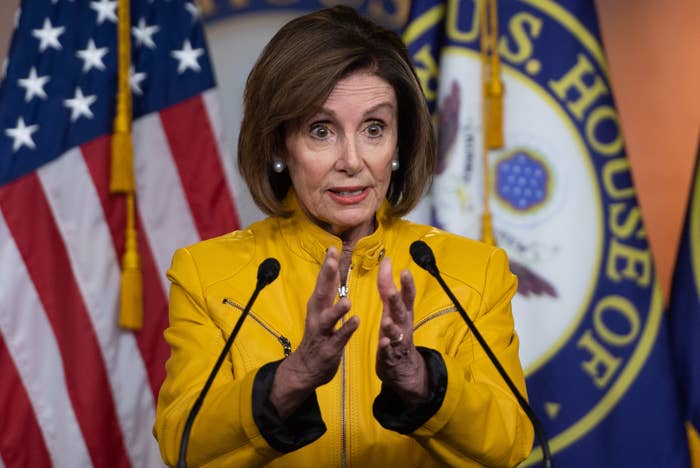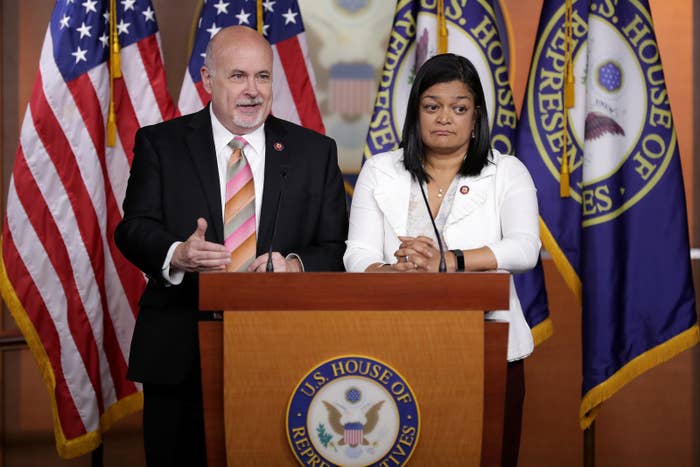
WASHINGTON — House Speaker Nancy Pelosi is keeping the left flank of her caucus in the dark as she works on legislation to bring down prescription drug prices, congressional progressive leaders said, escalating a fight between progressives and moderates in the chamber.
“It’s like we’re back in the days of oral stories and there’s no written word. We’ve never seen anything in writing,” Congressional Progressive Caucus cochair Mark Pocan of Wisconsin said in an interview with BuzzFeed News.
His cochair, Rep. Pramila Jayapal of Washington, expressed similar concerns. “We have not seen any paper on anything,” she said. “We often found out what was being proposed through [the press] ... There is no detail, and the devil is in the detail.”
It’s so opaque, Pocan said he doesn’t think a single House member is involved “at the level they should be, even the committee chairs.” But it’s a particular problem for the CPC, whose members have identified lowering prescription drug prices as a top priority for the caucus and hope to pull the legislation leftward.
“What I think I see is the progressive caucus seems to be the one aggressively pushing to make this bill better,” he added. “We’re just really concerned that when something gets introduced ... and our members don’t support it, that we don’t have a bill that passes.” The CPC has more than 90 members in the House and, as a group, could easily sink any legislation.
The battle over the prescription drug bill exemplifies the internal fights House Democrats have had repeatedly on issues like Medicare for All and impeachment since reclaiming the majority in the chamber, as progressives push for bold action and sweeping policy proposals, while Pelosi and her leadership hold the moderate line. But while those battles have remained largely civil, at least in public, the prescription drug fight is different. Progressives are now openly criticizing Pelosi and her top advisers on both strategy and legislative specifics — or, they argue, the lack thereof.
Democrats agree they need to do something to curb skyrocketing drug prices, which have captured the spotlight in recent months, as the cost of lifesaving drugs like insulin have increased by hundreds of dollars per vial. Between 2001 and 2005, drugmaker Eli Lilly increased the price of its insulin drug, Humalog, from $35 to $234 per vial, a 585% increase, the Senate Finance Committee found. Between 2013 and 2019, two other manufacturers, Novo Nordisk and Sanofi, increased their insulin prices by 87% and 77%, respectively.
And it’s not just specialty drugs. A 2017 survey found that and that 25% of people reported an increase in the costs of their prescriptions from 12 months earlier. One in seven people don’t pick up their prescriptions at all because they can’t afford them.
But six months after reclaiming the House, there has been little movement from Democrats on lowering prescription drug prices.
“It seems like there’s very clear collaboration with the drug companies, which is not a bad thing, but it can’t just be them,” Jayapal said of leadership’s strategy on the prescription drug bill. “It’s also got to be with advocates, with members, so we’re sure that we’re addressing a lot of the most important pieces that we will need to see in a piece of legislation before we would vote for it.”
In a statement to BuzzFeed News, Henry Connelly, a Pelosi spokesperson, said it was “absolutely not true” that leadership was working with drug companies.
“Leadership and the committees of jurisdiction continue to solicit feedback and incorporate ideas from across the Caucus in order to develop the strongest, boldest possible legislation to lower prescription drug prices for all Americans,” Connelly wrote, adding that that top committee Democrats have been doing a listening tour with progressive members as they work on the bill.
Jayapal’s office later clarified in a statement to BuzzFeed News, “What the congresswoman intended to say was that many industry representatives have had a strong voice in these conversations — and she wants to ensure that we strive to center the voices those most impacted: consumers and advocates.”

Pocan argues that Pelosi and her allies are not, in fact, working to put together the boldest proposal at all and instead simply trying to pass something that President Donald Trump will be willing to sign.
“What she’s doing right now is something that I see Democrats do sometimes too often … we’re already trying to negotiate among ourselves ahead of time, pre-negotiate, which is always a bad idea,” he said.
Trying to predict what Trump will sign is a futile exercise, Pocan lamented, and a trap, he said, that his party falls into too often.
“I don’t know why we would suddenly say, ‘Oh, this time he won’t pull the football, really. He will let us kick the football. This is the time he’s really serious about holding the football,’” the representative said.
Rep. Ro Khanna of California, a CPC member, echoed Pocan’s concern.
“If there was some commitment from [Senate Majority Leader Mitch] McConnell to move something in the Senate then I would be open to considering alternatives, but given that McConnell is unlikely to move anything, the House should pass the most progressive version of legislation that we can,” Khanna said in an interview with BuzzFeed News.
The infighting over the legislation has gotten intense and personal. Pocan laid at least part of the blame on a top Pelosi aide, calling out her senior policy adviser, Wendell Primus, by name.
“Wendell apparently has an idea in his head, but last time I looked, he hasn’t found a district to be elected in yet to directly impact things,” Pocan said. “And until that happens, members need to be involved in the process.”
Crafting legislation that Trump will like may also just be impossible. While the president has often talked about bringing down prescription drug prices as a priority, his attempts to do so thus far have targeted pharmacies, aligning the administration with pharmaceutical manufacturers, while Democrats favor the opposite approach.
Instead of trying to read the president’s mind, Pocan argued Democrats should be putting together an aggressive proposal that will bring Trump to the table, but based on the minimal information they have, Pocan is concerned Pelosi’s plan doesn’t go far enough.
In a briefing with reporters last week, Pocan and Jayapal said leadership’s plan would only tackle the 25 most expensive prescription drugs.
The reason, leadership has argued, is that the 25 most expensive prescription drugs account for a significant portion of Medicare spending. A senior Democratic aide said leadership is now open to increasing that number to 250, but the progressive caucus still has concerns.
“If 40% of people can’t afford a $400 emergency expense in the country ... it doesn’t matter if the drug is $500 or $95,000, it’s the same price: unaffordable,” Pocan said this week, citing Federal Reserve findings.
Additionally, CPC members said they are concerned that if the bill only controls the price of a small number of drugs, pharmaceutical companies may raise the prices of other drugs in an effort to maintain profits.
Pelosi’s plan, a Democratic source confirmed, is what’s known as an “arbitration model.” It would allow the Health and Human Services secretary to negotiate prices of prescription drugs covered by Medicare and a final price would be decided by the Government Accountability Office if the secretary could not reach an agreement with pharmaceutical companies.
It’s a model, progressive members argued, that would move slowly — which might help explain why the original list of drugs included was so small.
“If arbitration is going to take a really long time, then you might only get through six drugs or seven drugs, even if you could do 250, so there’s that concern. ... If the negotiations fall apart, how do you make the consequences of that so extreme that the drug companies don’t walk away from the table?” Japayal said.
The CPC, for its part, favors a bill that would allow for direct negotiations with pharmaceutical companies through Medicare, though that plan is not the be-all and end-all, Pocan said.
“The bottom line for us is that it has to be big enough that you have a large number of drugs covered, happen in an efficient amount of time, and actually have a hammer to make pharmaceutical companies have to comply,” Pocan said.
Notably, pharmaceutical companies have long contributed enormous amounts of money to congressional Democrats.
“Obviously, the impact of a special interest like that and contributions matter,” Pocan said, though he did not go so far as to say it would keep his colleagues from crafting strong legislation.
On Thursday morning, CPC members held a forum with activists to discuss the best plans to bring down costs, a move Pocan said he hopes will get the caucus’s ideas into Pelosi’s legislative bloodstream.
“If they’re not going to sit down and actually have the direct conversation with us about the bill,” he said with a smile, “we’ll be glad to have the indirect conversation about the bill.”

